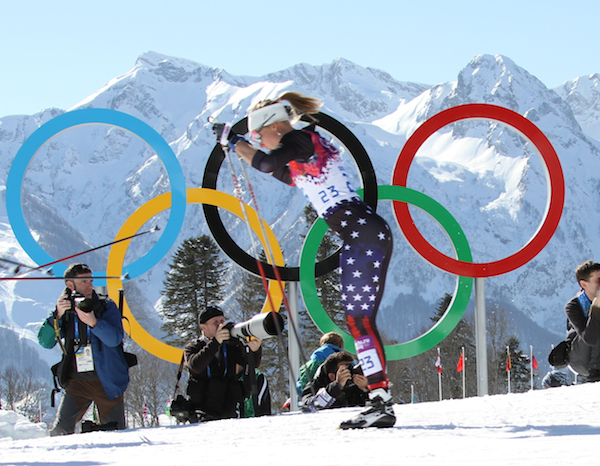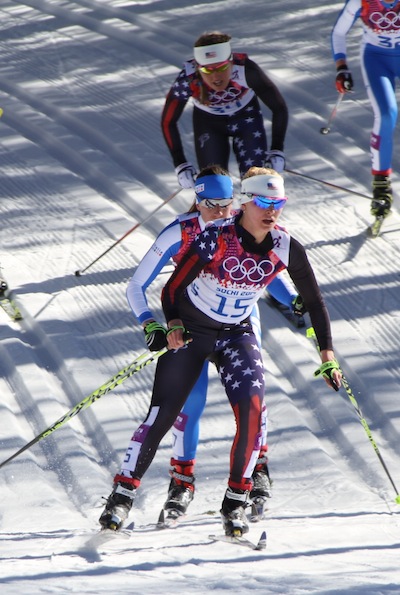
FasterSkier’s coverage is made possible through the generous support of Rudy Project.
SOCHI, Russia – For some of the skiers and biathletes competing on Saturday, the races represented their very first experience as Olympians.
For rookies – and even for veterans – the Olympics can be stressful. Even though the races have the same formats as other World Cup events throughout the season, the Olympics is something different.
So how did it go for the North American first-timers?
“It was good practice for just getting used to what the Olympics are like,” U.S. Ski Team member Sadie Bjornsen, 24, said after finishing 31st in the 15-kilometer skiathlon Saturday afternoon. “There’s a lot more stuff going on with nerves and stuff, it’s just sort of underestimated. So it’s good practice to get ready for some of the other races that I’m looking forward to more later in the week, like the 10 k classic on Thursday and then some relays.”

The best coming-out party undoubtedly belonged to Jessie Diggins, Bjornsen’s 22-year-old teammate who placed eighth in the skiathlon. It tied the best-ever finish by a U.S. woman in an Olympic cross-country ski race, equaling Kikkan Randall’s eighth place in the classic sprint at the 2010 Vancouver Games. And the consensus was that it was also one of the best classic races of Diggins’ career.
That it came with all the added hype was perhaps more impressive – or perhaps not. Diggins has shown nerves of steel over the last few years, including when she anchored the U.S. women’s relay team to its first podium in a World Cup race last winter. At the time, the result was something of a shock.
Instead of the pressure, Diggins talked after the race about other new experiences that are uniquely Olympic. For instance, her parents made the trip all the way to Russia to cheer for her. That doesn’t happen for a usual World Cup race. Diggins also dyed her hair, intending it to come out red and blue, but it turned out more pink.
“It’s nice because then my parents can always find me!” she laughed.
Another unique experience was the support Diggins gets from home. Athletes’ home clubs are always excited when they make the international circuit, but the Olympics is draws even more support. For one of the first times in years, the U.S. athletes were swamped in the mixed zone with media from standard American news outlets. On the less stressful side, they have received messages, videos, and cards from home.
“My teammates actually made an awesome video for us,” Diggins said of her Stratton Mountain School T2 team. “They re-wrote the words to a song and were dancing and lip-syncing, and it got me really fired up.”
“I’m just so excited to finally be an Olympian,” Diggins said. “It’s a really cool feeling.”
Nishikawa Leads Canadian Women
Of the three Canadian women in the skiathlon, two of them were in their first Olympic race and another hadn’t raced at a World Cup outside of Canada in seven years. Emily Nishikawa, 24, led the team in 42nd at her first Olympic race.
“I was fighting hard; I felt really good today,” Nishikawa said after the race. “I’m just so happy to be out here. It was really cool at the start to hear the crowd and to enjoy the moment.”
As for nerves, the Whitehorse, Yukon, native said she was mostly excited.
“I had a big smile on my face right at the start and I was really happy to be here,” she said. “I pushed hard and hung in there with the skate. …I think I did a great job with racing and I did a good job with the pace.”
Last year, Nishikawa made her World Championships debut in Val di Fiemme, Italy. Before that, she had only raced two World Cups outside of the country. Comparing her Olympic experience so far to World Championships, she said she’s healthier and “feeling stronger all around.”
Brittany Webster, 26, placed 51st in the skiathlon — her first Olympic race after making the Olympic team in Vancouver but missing out on competing because of sickness. Feeling pretty collected in the morning, she said that changed before the race.
“We got to the start line and I was like, ‘This is a big deal,’ ” Webster said. “I definitely got nervous. The beginning of the race started really hard and not being used to the World Cup races took a little getting used to, but the experience of having your first race under your belt is going to be so good for the rest. I was so happy, the fans were amazing, the skis were great, and it was just so nice to racing a whole bunch of girls who are the best in the world.”
Before Sochi, Webster and Amanda Ammar trained in Seefeld, Austria, just over a week before the Olympics. They were officially named to the Olympic team on Jan. 24.
“We had a pretty crazy travel schedule; lots of train rides, lots of walking with ski bags, planes, things like that,” Webster said. “We are so happy to be here. Sochi is so amazing. We never really expected this. We’ve had a pretty good surprise.”
A 2006 Olympian, Ammar finished 55th on Saturday — two days after her 28th birthday — in her first Olympic skiathlon.
“It’s been seven or eight years since I’ve been on a World Cup so I expected the pace to be hard,” Ammar explained. “But still once you’re living it, it’s like, it’s Marit Bjørgen! It’s Therese Johaug! These girls are fast! It’s the Americans. It was tough and you just hold on for dear life. … Just to be here I am so proud of myself. Even though on the results today it’s nothing phenomenal.”
Smith Top North American Biathlete

In his first Olympics, Canadian biathlete Nathan Smith had the added nerves of starting first of 87 athletes in the men’s 10 k sprint on Saturday night.
“It was a little bit nerve-wracking,” Smith, 28, said. “The crowd pays a little bit more attention to you, and I haven’t started first before. Last night when I found out I was number one, I was like, ‘Wow.’ So I gave it some thought and thought of some strategies for the range where I could stay focused.”
In the end, it worked out as Smith held his position and finished with the fastest time, holding off Sweden’s Fredrik Lindstroem in bib 2. The two skied the exact same course times and also cleaned, but Smith shot faster on his way to hitting all 10 targets.
In fact, he tied teammate Jean-Philippe Le Guellec with the seventh-fastest shooting time. While Le Guellec posted his best Olympic result of fifth on Saturday, Smith broke through in 13th.
“I knew I could do this sort of race; you can’t always shoot clean, so I’m really happy with that,” Smith said, adding that he’d hoped for a top 16. “I had ambitious goals, but this year has been a big step up for me so I didn’t want to expect too much. At the beginning of this year I had no qualification criteria for the Olympics, and now I’m having great races.”
For the first time this year, American Leif Nordgren, 24, also shot clean in a competition — doing so at his first Olympics. He placed 45th in the sprint with perfect shooting and a couple close calls during three loops around Sochi’s hilly course.
With a near-50-degree afternoon cooling down significantly before the start of the 6:30 p.m. race, Nordgren said the moisture in the snow hardened and he almost crashed on one of the downhills on his second loop.
“I barely held on,” he said. “Which would’ve hurt.”
On the last loop, he pinched a nerve in his back and nearly fell to the ground. But all was well at the finish — Nordgren’s top-60 finish qualified him for Monday’s pursuit, and his physiotherapist got him “back up and running!” he later tweeted.
“I was probably a little bit more nervous then most World Cup races, but I just tried to put that deep down and focus on the things that you work on during training,” he said. “It paid off pretty well. This is the first time i’ve shot clean all year so I was really happy with that and looking forward to the pursuit now.”
As for the atmosphere, with bright lights illuminating the 3.3 k loop as if it were in broad daylight and an enclosed range directly in front of the stadium, Nordgren said, “It’s a really fun atmosphere … there’s not a ton of fans here, but they’re all pretty energetic. There’s actually a pretty good American fan base, so the atmosphere is really fun and exciting.”
Another American biathlete in his first Olympics, Russell Currier, 27, said the crowd size couldn’t compete with the World Cup in Oberhof, Germany, but it didn’t have to.
“Just the hysteria that comes with it is always ahead of anything else out there, at least for us anyway,” he said.
Currier placed 61st, less than three seconds out of the top 60 needed to qualify for the pursuit. He missed four prone shots, costing him about a minute and a half on the penalty lap, and he finishing 2:25 behind Norway’s winner, Ole Einar Bjørndalen, who won his seventh Olympic gold and 12 medal to tie Bjørn Dæhlie for the most Winter Olympic medals of all time.
“First race is always stressful,” Currier said. “I [was] just trying to have fun and focus on the process and not to build up any results and see what happens, essentially. For the most part a lot of things went really well today and one really key thing didn’t go so well.”
While it wasn’t the race he was hoping for, he couldn’t be disappointed with making it to Russia for a once-in-four-years opportunity.
“At the end of the day, it’s still the Olympics so I’m happy just to be here,” he said.
Alex Kochon
Alex Kochon (alexkochon@gmail.com) is a former FasterSkier editor and roving reporter who never really lost touch with the nordic scene. A freelance writer, editor, and outdoor-loving mom of two, she lives in northeastern New York and enjoys adventuring in the Adirondacks. She shares her passion for sports and recreation as the co-founder of "Ride On! Mountain Bike Trail Guide" and a sales and content contributor at Curated.com. When she's not skiing or chasing her kids around, Alex assists authors as a production and marketing coordinator for iPub Global Connection.



